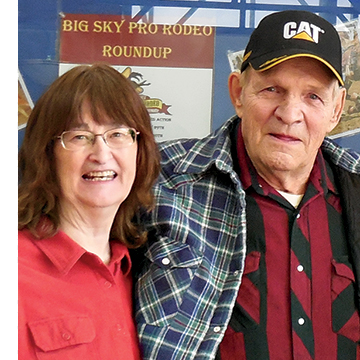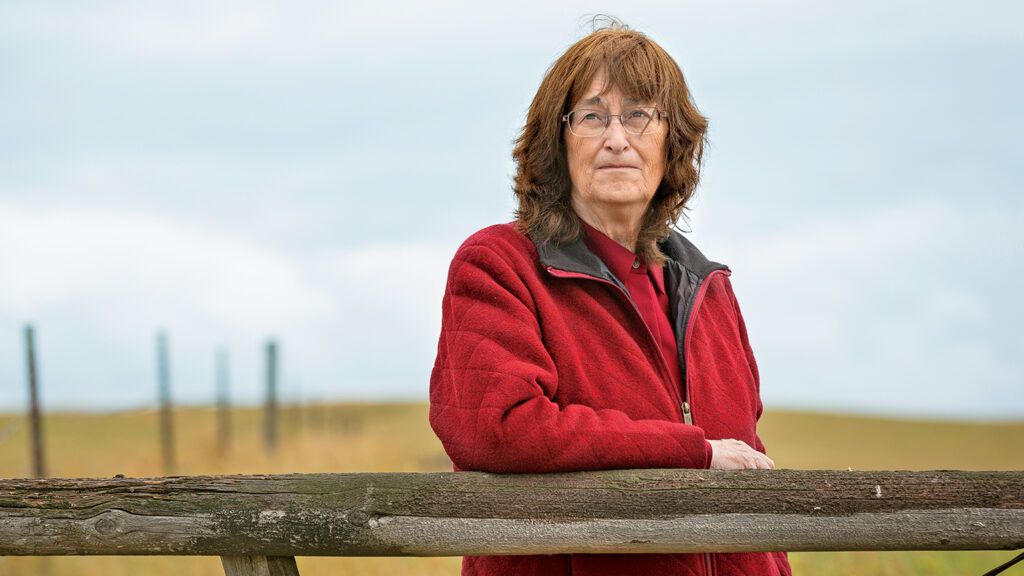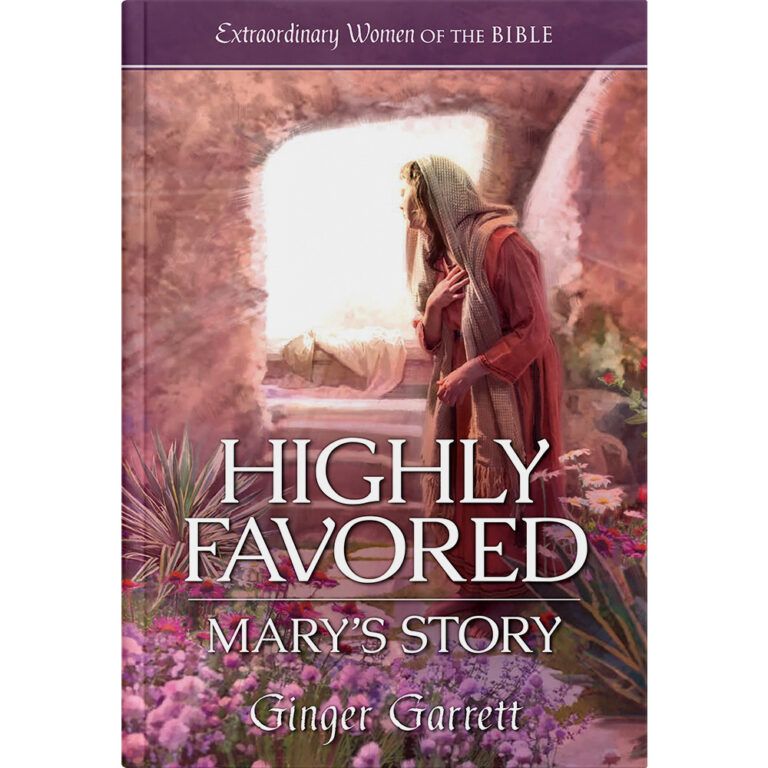“Wanda,” Rick said, his voice holding a note of warning as he shuffled papers on the table. “You know it rained last week?”
“Yes,” I said, fully aware of what the auctioneer was about to say.
“The auction sale up north was canceled because the road was so bad. They’ve rescheduled it for Saturday. This Saturday. Your sale day.”
October 1—five days away. I turned and looked out the window. All the decades of our labor were lined up in the pasture by the house: the tractors, trucks, combines, toolbars. Machinery that my husband, Milton, had used for more than 45 years to run our farm in eastern Montana. He had died of lung cancer six months earlier. Now everything had to be sold.
“A lot of buyers will go to that sale up north,” Rick continued. “I’m afraid we won’t have a very good turnout.”

four decades, in 2014
I closed my eyes. If only I could run away and hide someplace instead of having to watch Milton’s tools and equipment going once, twice—gone! Not only would we have half the buyers, but wheat and calf prices in 2016 had fallen like a rock, resulting in much lower bidding at farm auctions. Rick knew this. He’d been watching it at every one of his sales that year. My children had even asked me if we should put off the auction until the next year because equipment was bringing in such poor money. But I couldn’t. The deal was made. Advertisements gone out. Posters put up. And who knew if it would be any better come spring?
The simple fact was I needed what that sale would bring. Not only to live on, since the income from our farm was now gone, but also to pay the myriad expenses that never quit. Taxes on the land. Insurance. Lawyers. The funeral. I’d never once thought of having to buy a tombstone.
I clenched my hands and turned back to Rick. “We have to do it,” I said, “even if it doesn’t go very well.”
“Do you want to put a bottom on the tractors?” he asked. “I know they’re not going to bring what they’re worth.”
I thought back to the day Milton had bought his beautiful Cat tractor, how happy he’d been to get it and how easy it made his work. It had rubber tracks instead of tires and effortlessly pulled the seeder up the hills in our fields. But I couldn’t keep it. I was through with farming too.
“No,” I said. “This is an auction sale. It brings what it brings.”
Each day leading up to the auction seemed to crawl—yet at the same time fly by. All three of our grown children came to help. Together Ross, Kristi and Jeannie worked outside until dark, trying to get everything ready. They power-washed the pickups and semis, moved corral panels and cattle feeders, and got the last of the tools out of the shop. I watched in a daze as the foundation of our life passed before me.
When all the engines and chains were silenced for the night, I sat in my chair and worried. Is it all going to go cheap like Rick thinks, or will we get a little something for it?
A hot July day drifted back to me. Milton had been gone three months. I was cleaning his shop, weeping as I sorted through the tool boxes we’d taken on jobs building dams for ranchers. Every time I picked up a wrench, a memory came back. Milton working on a breakdown and me rummaging in the box to find what he needed. I always told him he was the surgeon and I was the nurse, standing beside him with the tray of his tools. Handling them now tore my heart out. I wanted to grab every one and stash them in the cellar so no one else could touch them.
“I can’t do it!” I said out loud. “How can I let them go?”
Then I heard the voice of the man I loved for more than 45 years: I don’t need them anymore, honey. Let them go to a young man who can use them. Now, three days before our auction, those words settled in my mind. Milton hadn’t said anything about money. Was I supposed to just trust that whatever we got would be all right?
I got up from my chair and went outside to look at the stars. Lord, I’m really afraid. You know I need a good auction sale to keep going. Can I trust you? Will you bring the right people?
I waited, listening, but there was nothing. Not even a falling star.
Thursday morning, I walked out to say goodbye to our old friends. I patted the faded black hood of the ’51 Chevy truck that our kids had driven. I stopped in front of the blue gravel truck, an ancient Ford that lumbered down the road like a Clydesdale. I loved to use it for hauling wheat to the bins during harvest. The calf shelters Milton had made by splitting an oil field tank in two. The loading chute he’d welded together from used pipe and sucker rod. The Massey combines he’d literally worn out cutting our crops. I remembered all the hours I’d sat with him in the cab, proud of the crop he’d grown, watching the hopper fill up behind us with the clean fragrant kernels of wheat, barley, oats.
As I roamed the hillside, it occurred to me how many of these things Milton had bought at auction sales. Some really cheap. A godsend to us when we were struggling to build up our farm. Next to broke and looking for a deal. Every time Milton had found something at a low price, I’d thank God for his generosity. He’d taken care of us then—would he do it for me now?
On Saturday, cars and pickups drove into the yard. But Rick was right—not very many buyers. His singsong voice carried into the house as I watched him start the sale. Our friends and neighbors grouped around the drill trailer. Sold! Slowly they trickled to the livestock equipment. Sold! Then they moved on to the augers, toolbars and drills. Sold! I walked outside when they reached the heavy equipment. Sold! Then the black Chevy truck. The old Ford. And finally the big Cat tractor. All sold.
For two weeks, I waited while Rick tallied up the books. I helped buyers when they came to pick up the pieces they’d bought. Chance, a young man who raised pigs with his wife and daughter, came by for the calf shelters.
“When I saw them,” he said, “I knew they were just right for my sows.”
I smiled. Who would have thought?
Sam, who ran sheep south of Brockway, came by to get the feeders.
“Why in the world did you buy these?” I asked. They were set on three-foot stands, way too high for sheep to eat out of.
“I’m going to take these home and cut off the legs,” he said, affectionately patting one metal side. “They’re going to solve my feed problem.”
I looked at Sam’s pickup. It wasn’t new. His boots had seen many miles. But he was eager and willing to work to put his place together. I glanced up at the sky, suddenly sure. Milton had been right. God was helping these young farmers. And I knew, no matter what the final price came to on the auction sale, he would take care of me too.
For more inspiring stories, subscribe to Guideposts magazine.






